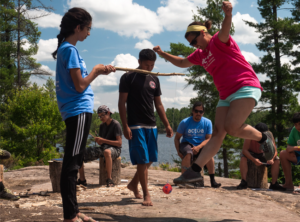Actua Canada gearing up to deliver STEM program to Indigenous Youth this summer

By Rick Garrick
OTTAWA and NORTH BAY — Actua Canada plans to provide an online option for its National Indigenous Youth in STEM (InSTEM) program this summer due to the COVID-19 (coronavirus disease 2019) pandemic.
“Typically, we would be partnering on the delivery of summer-based camps across the country in Indigenous communities where youth come for a week and participate in a whole bunch of hands-on activities and projects and community visits where they’re learning about STEM (science, technology, engineering and mathematics) and having fun and experiencing what it’s like to work in these areas,” says Jennifer Flanagan, CEO at Actua Canada. “So this summer, some of those will go forward depending on the area and of course, depending on what state of COVID-19 regulations we’re in. Some of those camps will be delivered online when that’s possible and when communities have access to technology, and when not, we have sent out to some communities a series of STEM kits.”
Flanagan says the STEM kits are sent to community contacts who provide them to youth in the community so they can do some of the activities even though they are not able to attend a STEM camp.
“Part of what we did in adapting to these new models of virtual and kit opportunities is we had a local artisan work with us and he harvested materials to build four cultural kits: a birch bark canoe; a teepee; a tikinagan, which is a cradleboard; and a qamutiit, which is an Arctic dog sled,” says Doug Dokis, director of National Indigenous Youth InSTEM at Actua Canada. “We supplement those kits with corresponding or aligned STEM kits and send those out to communities so they can build in cultural components into the youth’s experience. They see the relevance between the cultural activity and the STEM kit activity.”
Dokis says there has been an “amazing” response from the youth to the InSTEM program since it was launched about 27 years ago.
“Particularly from the land camps that we’ve run, it’s hard to even describe the change that happens with these youth that attend; the sense of identity, the sense of pride, the sense of community that they gain by being in an environment where they’re not being measured by say their academic standing,” Dokis says. “They recognize that they are part of a cohesive coherent group of young Indigenous people that have something in common and that all have something to contribute to that learning experience. The change and the personal growth that happens is just incredible.”
Actua Canada represents and supports 43 organizations located at universities and colleges across the country through a network that delivers a host of on and off-campus programming including outreach work within their local communities and beyond.
“The whole intent behind these programs is to really support and encourage [youth] and create a space where they feel like they can achieve,” Dokis says. “We really look at creating environments of success for them and that comes through both by introducing them to the Elders and the cultural aspects of the program but also the STEM components that we introduce and our instructors really encourage and support that.”
Dokis says one moment of success can make all the difference in a person’s life path.
“That’s what we’re hoping to do is be those people that make a difference in those youth’s life paths, that important critical time in their life,” Dokis says.
The Actua network held an Indigenous Land-Based STEM Education – The Classroom of the Future gathering last November with about 100 Indigenous educators, thought leaders and representatives of education authorities across Canada.
“Land-based learning, grounded in Indigenous knowledge provides Indigenous students with a sense of pride in their identity; and confidence that the knowledge and perspectives of their culture are not only validated — but also valued,” Dokis says. “There must be a recognition and acceptance that Indigenous and Western science educational pedagogies do not need to be in opposition to one another.”
Actua Canada recently released an Indigenous Land-Based STEM Education Discussion Paper, which is located online.

